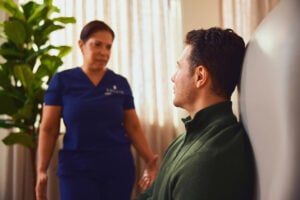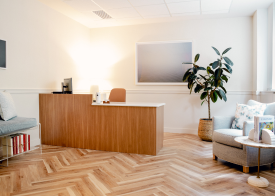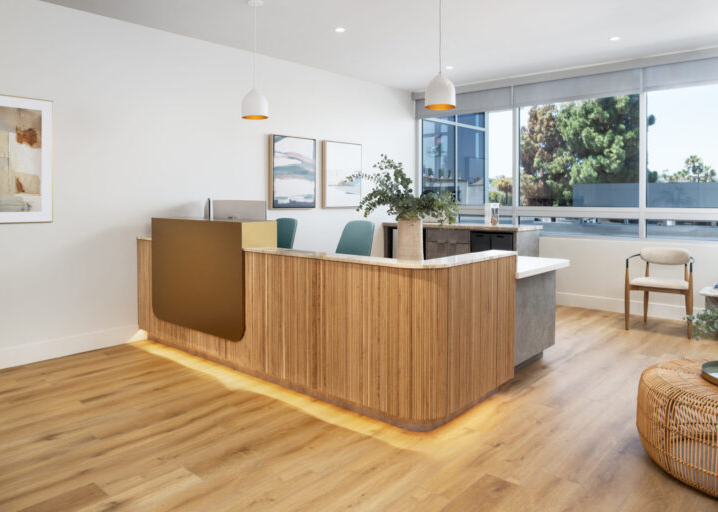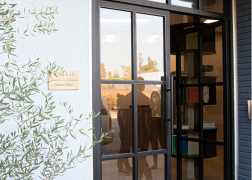So when were you diagnosed with endometriosis? You went to, what, four or five doctors before someone even mentioned endo?
I was diagnosed with endometriosis in 2018, after almost nine months of trying to figure out what was wrong with me. I went from doctor to doctor and most of the time, I ended up with more questions than answers. One doctor suggested I had bladder cancer, which was a terrifying experience. Another doctor thought my pain was caused by a hormonal imbalance, which led me to take unnecessary hormones for a while. After months of switching doctors and advocating for myself, I finally got a diagnosis that made sense: endometriosis. The craziest part is that if you look up the symptoms of endometriosis, I am a textbook case. There is no reason that a gynecological doctor should see a patient like me and not think of endometriosis immediately.
And what was it like being in that much pain and not being seen and heard?
I felt very isolated in my experience of finding a diagnosis. Since endometriosis is an “invisible disease,” it can be challenging to fully articulate the intensity of your pain—not only to doctors, but even to your family, friends, and significant other. I felt like nobody understood how much pain I was in but me. Therefore, I took it upon myself to be my biggest advocate and to not stop searching until I knew what was causing my pain.
Even though you’re close with your dad Jamie Foxx, you decided not to tell him you had endo until you scheduled your laparoscopic surgery. What made you a little hesitant?
The difficult part about endometriosis is that you cannot be sure you have endo unless you have surgery. This is something I hope will change in the future. The reason I didn’t tell my dad for so long is because I wasn’t even 100% sure that I had endometriosis. I remember being in the hospital bed before surgery and just hoping that I had it, because if I had endometriosis then at least I had an answer. I could do something about it.
“Until you find a treatment or a diagnosis that brings you true relief, keep demanding to be seen. You deserve to live a pain-free life.”

Beyond the benefits of surgery, have you discovered any holistic treatments you’d recommend?
Surgery is really the gold standard for endometriosis. However, I found that pelvic physical therapy was something that really prepared my body for surgery. It helped alleviate the muscular pain I was experiencing from years of chronic pain.
How did you learn to become a better advocate for yourself, and how has that impacted other parts of your life, especially your career?
I learned to trust my gut through this experience. You know when something is wrong and when something is right. Even though I had doctors telling me that I was “normal”, I knew that something was wrong. It took a lot of strength to tell a doctor they were wrong. I think that’s bled into how I approach work as well. When I’m on set or when I’m producing, there’s a lot of times you have to stand up for what you believe in—even up against big studios and executives.
As an ambassador for the National Alliance on Mental Illness and the Endometriosis Foundation of America, can you talk a little about the important-but-often-overlooked connection between chronic pain and mental health?
I love this question! I’ve been working with NAMI and EndoFound to create a campaign that addresses chronic pain and mental health. Chronic pain is associated with anxiety, depression, and even PTSD. After going from doctor to doctor for years, that can be a really traumatizing experience. A big part of my endometriosis management is stress management. I noticed that my endo flares are worse when I’m not feeling my best mentally.
What advice do you have for someone who’s suffering from endo—or any chronic type of chronic condition—and having trouble getting the right help?
For someone suffering from endo or any chronic condition, I would say lean on your community. There’s an incredibly supportive endo community online that’s brought me comfort during the hard days. There’s also great advice and information in credible groups that can help point you in the right direction, in terms of treatment options.
“Since endometriosis is an ‘invisible disease,’ it can be challenging to fully articulate the intensity of your pain—not only to doctors, but even to your family, friends, and significant other. I felt like nobody understood how much pain I was in but me.”
Given that it takes an average of 8 doctors and 10 years to diagnose endometriosis, what can we do to help change that?
EndoFound has been doing incredible work to help change these barriers to diagnosis and treatment. We just had a huge win by the updating of insurance coding for endometriosis. Over 100 new codes for endometriosis have been added to the International Classification of Disease which will hopefully incentivize physicians to offer more endometriosis surgeries and treatments.
If there’s been any silver lining to having endo, what would you say it is?
I am way more in touch with my body than I think I could’ve ever been without endometriosis. I really understand the impact of food, exercise, medicine, stress, etc and how it affects my body. It’s made me more compassionate and appreciative of all that my body does for me.
Any good words to live by?
In terms of chronic illness, “never take normal for an answer.” Until you find a treatment or a diagnosis that brings you true relief, keep demanding to be seen. You deserve to live a pain-free life.







